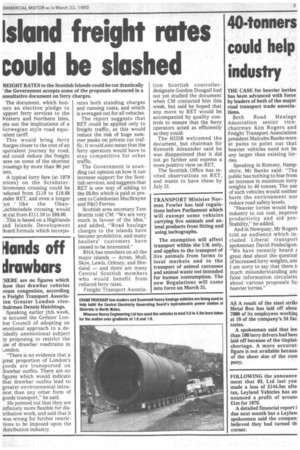Island freight rates could be slashed
Page 5

If you've noticed an error in this article please click here to report it so we can fix it.
ItEIGHT RATES to the Scottish Islands could be cut drastically ' the Government accepts some of the proposals advanced in a onsultative document on ferry charges.
The document, which hon)urs an election pledge to upport ferry services to the Western and Northern Isles, ets out the implications of a gorwegian style road equitalent tariff.
This would bring ferry tharges closer to the cost of an :quivalent journey by road, Ind could reduce the freight .ates on some of the shortest :.rossings by more than 90 per A typical lorry fare (at 1979 )rices) on the Scrabsteritromness crossing could be -educed from £110 to £19.68 inder RET, and even a longer -un ' like the Oban:..ochboisdale crossing would )e cut from £111.10 to £69.06.
This is based on a Highlands ind Islands Development Board formula which incorpo rates both standing charges and running costs, and which is averaged out for all vehicles.
The report suggests that RET could be applied only to freight traffic, as this would reduce the risk of huge summer peaks on private car traffic. It would also mean that the ferry operators would have to stay competitive for other traffic.
The Government is sounding out opinion on how it can increase support for the Scottish services, and suggests that RET is one way of adding to the £6.6m which is paid at present to Caledonian MacBrayne and P&O Ferries.
Scottish area secretary Tom Brattin told CM: "We are very much in favour of the idea," and added, "Road haulage charges to the islands have become prohibitive, and many hauliers' customers have ceased to be interested."
RHA has members on all the major islands — Arran, Mull, Skye, Lewis, Orkney, and Shetland — and there are many Central Scottish members who would benefit from reduced ferry rates.
Freight Transport Associa tion Scottish controllerdesignate Gordon Dougall had not yet studied the document when CM contacted him this week, but said he hoped that any move to RET would be accompanied by quality controls to ensure that the ferry operators acted as efficiently as they could.
The HIDB welcomed the document, but chairman Sir Kenneth Alexander said he was disappointed that it did not go further and express a more positive view on RET.
The Scottish Office has invited observations on RET, and wants to have these by July 31.
































































































































